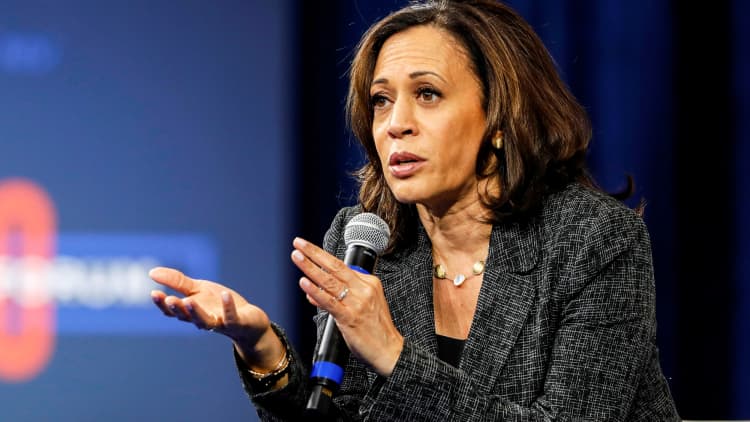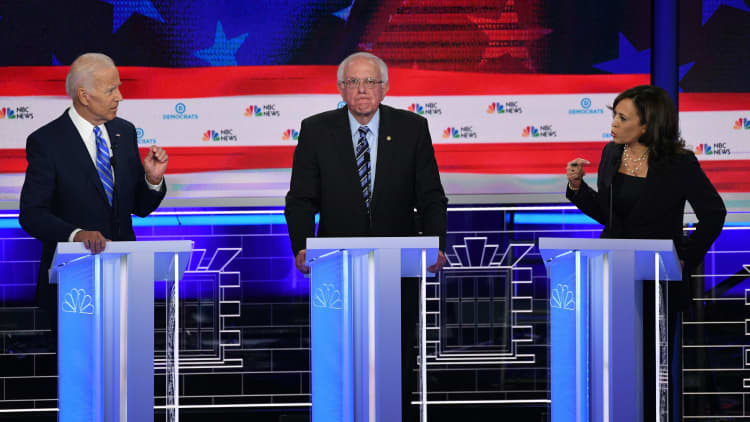
Sen. Kamala Harris suspended her presidential campaign Tuesday, after falling from the top tier of Democratic candidates and failing to resurrect a doomed fundraising operation.
"I've taken stock and looked at this from every angle, and over the last few days have come to one of the hardest decisions of my life," Harris, D-Calif., said in a statement shortly after her departure was first reported.
"My campaign for president simply doesn't have the financial resources we need to continue."
Earlier Tuesday, CNBC reported that Harris canceled a fundraising event in New York amid a flood of recent reports describing her campaign as chaotic.
Some of her top bundlers expected her fourth quarter totals to be a "disaster" and noticed that the "events were not going well," according to a member of her finance committee, who spoke to CNBC on Tuesday on the condition of anonymity.
CNBC reported in October that donors were struggling to persuade their networks to write checks to her campaign. In some cases, many of her supporters have told the campaign that they will not host events for her.
Harris informed her staff Tuesday that she is suspending her campaign, an aide told CNBC prior to her official announcement.
Harris, 55, was the only black candidate whose polling numbers and national media attention had placed her in the top tier of the 2020 contest, if only for a short while.
She made waves with her announcement in January, nailing a campaign rollout that earned hearty praise from Democrats – and even a compliment from President Donald Trump.
"I would say, the best opening so far would be Kamala Harris," Trump said at the time.
In the months following her positive first impression, Harris and her campaign showed the makings of a contender who might be in it for the long haul.
She landed perhaps the hardest and clearest punch of the early primary debate cycle when she tore into the front-runner Joe Biden over his comments about working with segregationist lawmakers and his past views on busing.

The attack on the former vice president gave her a spotlight on that stage, as well as a clear bump in the polls and a hefty fundraising boost.
But her rise in popularity appeared to evaporate soon after, and her performance in the second debate was widely viewed as subpar. Harris' fundraising numbers consistently trailed her leading competitors, and some of her donors reportedly considered dropping her if she failed to impress going forward.
Asked about Harris' exit, Biden said he had "mixed emotions," though he added that Harris was a first-rate intellect and a strong competitor, NBC News reported.
A spokesman for the Trump campaign did not immediately respond to CNBC's request for comment.
Harris also faced criticism on her policy platform. In her breakout first debate performance in June, Harris had raised her hand when a moderator asked which of the candidates supported abolishing private insurance in favor of a government-run single-payer alternative. A day later, she appeared to reverse herself, saying a Harris administration would preserve supplemental private insurance.
As the Iowa caucuses neared, Harris' campaign further suffered from a lack of a clear strategy and a fractured and disgruntled campaign staff, according to multiple media reports.
By the end of November, the RealClearPolitics aggregate of candidate polls showed Harris sliding into the low single digits, while the nearest candidate above her, South Bend Mayor Pete Buttigieg, appeared to be surging higher.
In one of the clearest signs that her campaign was on the rocks, Harris canceled a big-money fundraiser set for Tuesday afternoon in New York. The event was canceled due to an unexplained "personal matter," sources told CNBC.
Tickets started at $500 and went up to $2,800, the maximum a donor can give during a campaign cycle.
Word of Harris' decision to drop out was first reported by The Atlantic prior to her official announcement.



